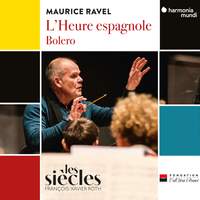Recording of the Week,
L'Heure espagnole from François-Xavier Roth and Les Siècles

The all-Francophone cast is uniformly terrific, not least because everyone’s so mindful of Ravel’s stipulation that (with one exception) all of the performers should ‘speak more than sing’ their roles, in a manner more akin to the recitatives of Italian buffo rather than French grand opera. Presiding over everything with unflappable chic is the classy mezzo Isabelle Druet, who trained as a ‘straight’ actress before pursuing an operatic career and whose experience in recitative-heavy Baroque repertoire has further honed her ability to deliver text in the conversational style which Ravel envisaged.

The men in her life are characterised with the same style and subtlety, with Julien Behr (who sang an outstanding Pelléas for Roth) striking an ideal balance between the sublime and the ridiculous as the narcissistic poet Gonzalve, constantly spewing forth elaborate ‘Baroque verses’ whilst his pragmatic mistress is anxious to get down to business. It’s as if Debussy’s hero has accidentally wandered into an Offenbach operetta, and both he and Roth endow his music with such lyric beauty that it’s impossible to share Concepción’s impatience with his musings.
Thomas Dolié is irresistibly endearing as the respectful, tongue-tied Ramiro: this descendent of toreadors is no one-dimensional beefcake, but a quietly poetic soul who gives Gonzalve a run for his money in the eloquence stakes as he likens the ‘delicate mechanisms’ of Torquemada’s clocks to the mysteries of the female psyche (and possibly body…it’s open to interpretation). With a voice almost as beguiling as Behr’s, Loīc Félix makes Concepción’s husband Torquemada a more sympathetic character than usual, and Jean Teitgen is delightfully bumptious as the lecherous, self-important financier Don Iñigo.

And Roth’s own precision throughout would rival the clockmaker’s finest wares: Ravel’s every tempo-marking (and there are many) is observed to the letter, but nothing sounds less than entirely spontaneous.
It was a little masterstroke to position Boléro as a sort of postlude to the opera. Adhering to the composer’s own metronome-marking (notoriously contested by Toscanini and others), Roth plays it absolutely straight, with minimal rubato and only the slightest licence to individual players in terms of the portamenti and hairpin bulges we hear so often here. Even if you feel you’ve heard this piece often enough to last you a lifetime, I promise Roth will make you listen with fresh ears.
Isabelle Druet (Concepción), Julien Behr (Gonzalve), Loïc Félix (Torquemada), Thomas Dolié (Ramiro), Jean Teitgen (Don Iñigo Gomez)
Les Siècles, François-Xavier Roth
Available Formats: CD, MP3, FLAC, Hi-Res FLAC



